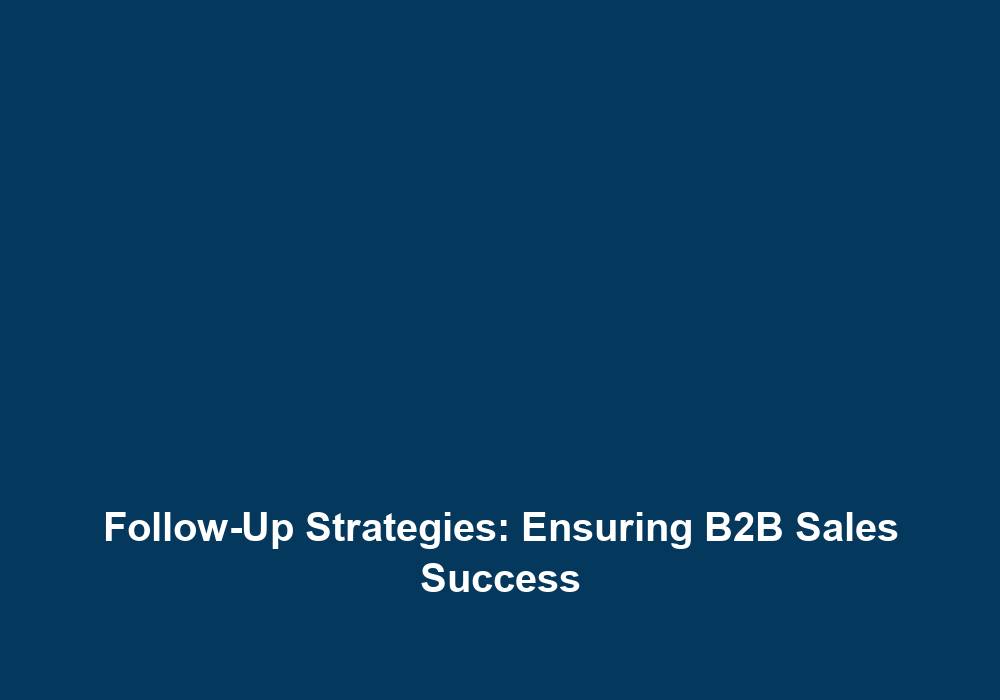In today’s competitive business landscape, following up with potential clients and nurturing leads is crucial for achieving B2B sales success. Effective follow-up strategies can significantly impact conversion rates, build trust, and strengthen relationships with prospects. This article will delve into various follow-up techniques and best practices that can help businesses maximize their sales potential.
Importance of Follow-Up Strategies in B2B Sales
Building credibility:
Consistent and timely follow-up demonstrates the commitment and professionalism of your business. It reinforces the credibility of your brand and enhances the trust that potential clients place in your company. When you consistently follow up with prospects, it shows that you value their time and are dedicated to meeting their needs. This builds trust and establishes your business as a reliable and credible partner in their decision-making process.
Nurturing leads:
Many B2B sales cycles are lengthy and require multiple touchpoints to convert leads into customers. Implementing effective follow-up strategies allows you to nurture leads, answer questions, address concerns, and provide the necessary information to move prospects closer to making a purchase decision. By maintaining regular communication with leads, you can guide them through their buyer’s journey and provide the support they need to feel confident in choosing your product or service.
Staying top-of-mind:
By keeping in regular contact with prospects, you ensure that your business remains top-of-mind when they are ready to make a buying decision. Consistent follow-up helps you stay ahead of the competition and increases the likelihood of winning their business. When prospects are consistently reminded of your brand, they are more likely to think of you when they have a need that aligns with your offering. This can give you a competitive edge and increase your chances of closing the deal.
Best Practices for Effective Follow-Up
1. Define Follow-Up Objectives
Before initiating any follow-up activity, it is essential to define clear objectives. Understand the purpose of your follow-up, whether it is to provide additional information, address concerns, schedule a meeting, or close a sale. This clarity will guide your approach and help you tailor your communication accordingly. By setting clear objectives, you can ensure that each follow-up interaction has a specific goal and is designed to move the prospect further along the sales funnel.
2. Personalize Your Follow-Up
Personalization is key to effective follow-up. Address the prospect by their name, reference previous interactions, and highlight specific pain points discussed during previous conversations. By personalizing your follow-up, you demonstrate that you value the relationship and are genuinely interested in meeting their needs. Personalization helps to establish a connection with the prospect and shows that you have taken the time to understand their unique challenges and requirements.
3. Timely and Consistent Communication
Timeliness is of utmost importance in follow-up strategies. Respond promptly to inquiries, provide requested information promptly, and schedule follow-up activities without unnecessary delays. Consistency is also crucial – establish a follow-up cadence and stick to it. Regular communication shows your dedication and reliability, while avoiding excessive contact that could be perceived as pushy or intrusive. By being timely and consistent in your follow-up, you demonstrate professionalism and reliability, which can instill confidence in prospects.
4. Utilize Various Communication Channels
Diversify your communication channels to cater to the preferences of your prospects. Some may prefer email, while others may prefer phone calls or even face-to-face meetings. By offering multiple channels, you provide convenience and flexibility, enhancing the overall customer experience. Keep track of the channels preferred by each prospect and adapt your approach accordingly. This allows you to meet the prospect where they are most comfortable, increasing the likelihood of engagement and a positive response.
5. Provide Value with Every Interaction
Each follow-up interaction should add value to the prospect’s journey. Share relevant industry insights, provide helpful resources, or offer personalized solutions that address their specific pain points. By delivering value, you establish yourself as a trusted advisor and increase the chances of converting prospects into loyal customers. Providing valuable information and insights positions your business as a thought leader in the industry and demonstrates your expertise, which can differentiate you from competitors.
6. Leverage Automation and CRM Tools
Leveraging automation and customer relationship management (CRM) tools can significantly streamline your follow-up process. These tools allow you to schedule and automate follow-up activities, track customer interactions, set reminders, and personalize communication at scale. Utilizing technology can enhance efficiency, improve organization, and ensure no opportunity falls through the cracks. Automation and CRM tools can help you stay organized, save time, and ensure that no follow-up tasks are overlooked.
7. Track and Analyze Performance
To continuously improve your follow-up strategies, it is essential to track and analyze performance metrics. Monitor response rates, conversion rates, and lead progression to identify areas for improvement. Use this data to refine your follow-up approach, optimize your messaging, and enhance the overall effectiveness of your sales process. By analyzing performance, you can identify patterns and trends, allowing you to make data-driven decisions and continuously improve your follow-up techniques.
Conclusion
Follow-up strategies play a vital role in ensuring B2B sales success. By implementing personalized, timely, and consistent follow-up techniques, businesses can build credibility, nurture leads, and stay top-of-mind with prospects. Remember to define clear objectives, provide value, leverage automation tools, and continuously analyze performance to refine your approach. With effective follow-up strategies in place, you can enhance your chances of converting leads into loyal customers and drive sustainable business growth in the competitive B2B landscape.

Your exploration of follow-up strategies in B2B sales is both timely and essential in today’s business environment, where trust and long-term relationships are paramount. As someone who has worked in B2B sales for several years, I can attest to the significant impact that a well-crafted follow-up strategy can have not just on individual sales, but on the overall business reputation.